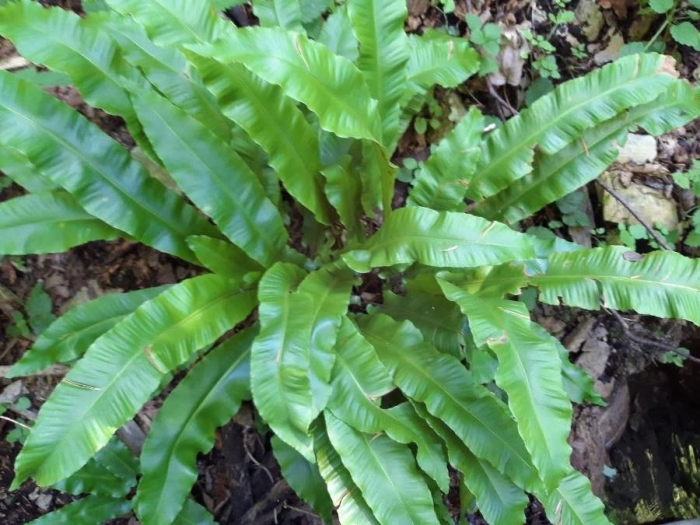Hart’s Tongue Fern
(Asplenium scolopendrium)
Hart’s Tongue Fern (Asplenium scolopendrium)
/
/

Muñoz Felipe
CC BY-SA 4.0
Image By:
Muñoz Felipe
Recorded By:
Copyright:
CC BY-SA 4.0
Copyright Notice:
Photo by: Muñoz Felipe | License Type: CC BY-SA 4.0 | License URL: https://creativecommons.org/licenses/by-sa/4.0/ | Attribution: Muñoz Felipe (cc-by-sa) | Rights Holder: Muñoz Felipe | Publisher: PlantNet | Date Created: 2019-08-18T13:15:39Z | Title: Asplenium scolopendrium L.: leaf | Notes: |





















































Estimated Native Range
Summary
Asplenium scolopendrium, commonly known as Hart’s Tongue Fern, is an evergreen fern native to a variety of habitats including damp, shaded woods, rocky crevices, and limestone pavement areas across Europe, eastern North America, and parts of Asia. This fern is notable for its simple, undivided fronds that resemble the tongue of a hart, which is an old term for a male red deer. The fronds are glossy green, tongue-shaped, and can grow up to 60 cm long. The plant forms a rosette and the fronds emerge directly from the rhizome. It is a slow-growing species that adds a unique texture to shaded garden areas.
Hart’s Tongue Fern is valued for its evergreen foliage and the structural interest it brings to woodland gardens and shaded borders. It is also suitable for growing in rock gardens or on shaded walls where its roots can penetrate the mortar. The species has won the Royal Horticultural Society’s Award of Garden Merit, indicating its excellence for garden use. Cultivars with various frond forms, such as ’Angustatum’, offer additional ornamental appeal. While the American variation is challenging to cultivate, the Old World variation is more commonly found in cultivation. It requires part shade to full shade, consistent moisture, and well-drained, humus-rich soil. Avoiding waterlogged conditions is crucial for its health.CC BY-SA 4.0
Hart’s Tongue Fern is valued for its evergreen foliage and the structural interest it brings to woodland gardens and shaded borders. It is also suitable for growing in rock gardens or on shaded walls where its roots can penetrate the mortar. The species has won the Royal Horticultural Society’s Award of Garden Merit, indicating its excellence for garden use. Cultivars with various frond forms, such as ’Angustatum’, offer additional ornamental appeal. While the American variation is challenging to cultivate, the Old World variation is more commonly found in cultivation. It requires part shade to full shade, consistent moisture, and well-drained, humus-rich soil. Avoiding waterlogged conditions is crucial for its health.CC BY-SA 4.0
Plant Description
- Plant Type: Fern
- Height: 1-1.5 feet
- Width: 1-1.5 feet
- Growth Rate: Slow
- Flower Color: N/A
- Flowering Season: Non-Flowering
- Leaf Retention: Evergreen
Growth Requirements
- Sun: Part Shade, Full Shade
- Water: Medium
- Drainage: Slow, Medium
Common Uses
Bank Stabilization, Border Plant, Low Maintenance, Potted Plant, Rabbit Resistant, Rock Garden, Street Planting
Natural Habitat
Damp, shaded woods, rocky crevices, and limestone pavement areas
Other Names
Common Names: Hartstonque, Hart’s-Tongue Fern, Hjortetunge, Hirschzunge, Langue De Cerf, Asplénium Scolopendre, Phyllitis Scolopendre, Scolopendre, Scolopendre Officinale, Tongvaren, Hjorttunga
Scientific Names: , Asplenium scolopendrium, Phyllitis scolopendrium subsp. scolopendrium, Phyllitis vulgare, Glossopteris scolopendrium, Phyllitis vulgaris,
GBIF Accepted Name: Asplenium scolopendrium L.